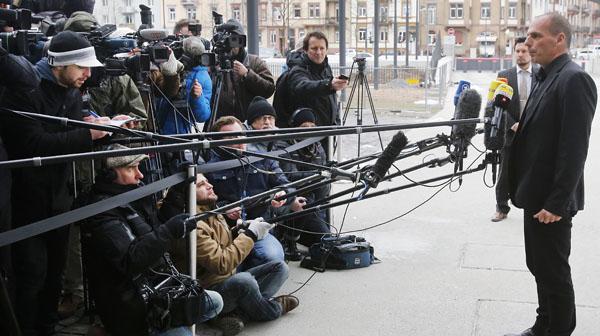You are here
Creditors to subject Greek deal to tough October review
By Reuters - Aug 12,2015 - Last updated at Aug 12,2015

Greek Prime Minister Alexis Tsipras looks on during a press conference at the Greek ministry of infrastructure, transport and networks in Athens on August 12 (AFP photo)
ATHENS/BRUSSELS — The European Union moved to keep Greece on a tight rein after its latest bailout, with sources saying the 85 billion euro deal will be reviewed by lenders in October and any discussion of debt relief will only come at a later stage.
Greece was forced to accept tougher terms than were initially on offer and its creditors want to be sure that reforms are being carried out as promised. Germany, for one, said the agreement lacked clarity on Greece's policy direction.
"There will be a strong first review of the implementation of measures in October," an EU source said.
At the same time, rescue funds for Greek banks will be placed in a special account and the lenders will receive fresh equity only after a "stress test" is finished by the end of October, several sources told Reuters.
An initial 10 billion euros will be made available "immediately" to shore up confidence in Greek banks, while authorities conduct a detailed asset quality review that is expected to take several months.
Greek banks will also have to submit viable business plans to European authorities before fresh support is disbursed, and will only receive cash once authorities sign off on the plans.
The bailout agreement reached on Tuesday gives Greece some respite after months of acrimonious talks with its creditors, the imposition of capital controls and a three-week shutdown of its banks.
It has however caused a rebellion in Prime Minister Alexis Tsipras's Syriza Party and could force early elections in the autumn, while doubts remain about whether a leftist government elected on a pledge to reverse austerity can implement the tough terms of the deal.
The bailout, Greece's third since 2010, must still be adopted by parliament in Athens and approved by eurozone countries.
Tsipras said the agreement would end economic uncertainty as his government submitted a bill outlining a three-year bailout programme to parliament, pushing for quick approval that would allow rapid disbursement of aid.
Tsipras wants parliament to expedite its approval so committees can discuss the agreement before a vote expected on Thursday evening.
That would allow eurozone ministers meeting in Brussels on Friday to sign off on the deal and pave the way for aid to be disbursed before a 3.2 billion euro debt repayment falls due on August 20.
Reform details
The legislation covers tax and pension reform, public administration reform, the relaunch of a privatisation scheme, which stalled earlier in the year and the establishment of a wealth fund for privatisation projects which will be supervised by European institutions.
According to the 29-page memorandum of understanding Greece agreed with creditors, a copy of which was obtained by Reuters, Greek must move to rapidly privatise its ports, regional airports and its power grid operator.
Greece would also take steps to tackle the mountain of bad loans weighing on its banks.
Germany, the major eurozone contributor to successive Greek bailouts, welcomed the deal as a "substantial result", but wanted to study it further before submitting it for approval by parliament in Berlin.
"So one can say that the agreement goes in the right direction," said Steffen Seibert, Chancellor Angela Merkel's spokesman. "But at this hour it is not yet possible to say whether we are at the point where we can start the national process, in other words call for a vote in the Bundestag."
Germany's Finance Ministry criticised the memorandum of understanding (MoU) as showing "no full clarity on the direction of policies".
In a two-page paper entitled "preliminary check of MoU" that was sent to officials in Brussels on Wednesday, the ministry described Greek reform plans on debt sustainability and privatisations as "not yet compliant".
But reports that Germany had rejected the Greek rescue programme were wrong, the ministry said.
EU sources said on Wednesday that the long-running and often bad-tempered negotiations on the bailout improved after combative finance minister Yanis Varoufakis was removed from the talks.
The mood apparently changed after the appointment of Euclid Tsakolotos as finance minister in place of Varoufakis early last month.
"There was a sea change in the negotiations with the Greek authorities in recent weeks," one of the EU sources said.
"The new Greek finance minister has an absolutely different attitude in the talks than the previous one. Talks were very constructive," the source said.
Varoufakis, a charismatic motorbike-riding academic who describes himself as an "erratic Marxist", was feted as a political rock star when he took the finance portfolio after Syriza emerged victorious from an election in January.
But as the debt talks dragged on the confrontational Varoufakis lost the confidence of his negotiating partners, irritating German Finance Minister Wolfgang Schaeuble in particular and accusing Europe of "terrorism" in its attempts to resolve the Greek crisis.
Related Articles
ATHENS — Greek Prime Minister Alexis Tsipras announced his resignation and called for snap elections on Thursday, as he went on the offensiv
ATHENS — Greece's government on Tuesday submitted tough bailout terms demanded by eurozone creditors to parliament, as Prime Minister Alexis
Greece's new leftist government appealed to the European Central Bank (ECB) on Wednesday to keep its banks afloat as it seeks to negotiate debt relief with its eurozone partners, but Germany rejected any rollback of agreed austerity policies.














